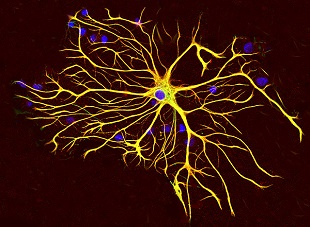 Star-shape brains cells called astrocytes play an important role in long-term potentiation, or LTP.WIKIMEDIA, GERRYSHAWThe annual Grete Lundbeck European Brain Research Prize—the world’s largest neuroscience award—was given to Tim Bliss, Graham Collingridge, and Richard Morris earlier this week (March 1), in recognition of their independent and collective contributions to the science of memory. The win marks the first time an all-UK lineup has received the award.
Star-shape brains cells called astrocytes play an important role in long-term potentiation, or LTP.WIKIMEDIA, GERRYSHAWThe annual Grete Lundbeck European Brain Research Prize—the world’s largest neuroscience award—was given to Tim Bliss, Graham Collingridge, and Richard Morris earlier this week (March 1), in recognition of their independent and collective contributions to the science of memory. The win marks the first time an all-UK lineup has received the award.
“The formation for memory underpins so many of the things that make us human—from recognizing the faces of those we love to learning a new language or enjoying our favorite song,” John Isaac, head of neuroscience and mental health at the Wellcome Trust, which helped to fund the research, said in a statement. “The three scientists honored today have made an enormous contribution to our understanding of this fascinating field, and it’s fantastic to see their years of hard work recognized publicly.”
Colloquially known as the Brain Prize, the €1 million award from the Grete Lundbeck European Brain Research Foundation in Denmark acknowledges the three scientists’ research on long-term potentiation (LTP), the phenomenon underlying the “fire together, wire together” principle of brain development and memory ...




















